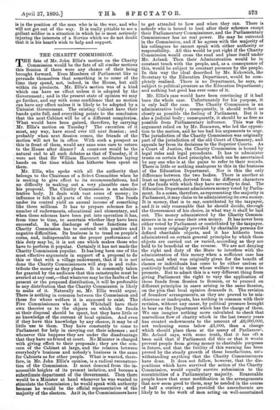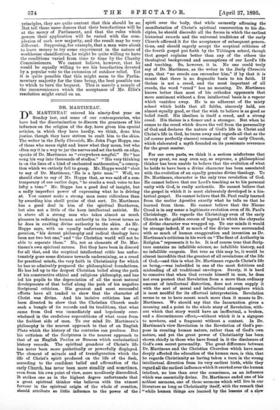THE CHARITY COMMISSION, T HE fate of Mr. John Ellis's motion
on the Charity Commission would be the fate of all similar motions this Session if there were any chance of their being brought forward. Even Members of Parliament like to persuade themselves that something is to come of the time they spend, not, indeed, in the House, but still within its precincts. Mr. Ellis's notion was of a kind which can have no effect unless it is adopted by the Government ; and in the present state of opinion we may go further, and say with some confidence that no motion can have any effect unless it is likely to be adopted by a Unionist Government. The existing Cabinet have their hands quite full, and everything points to the conclusion that the next Cabinet will be of a different complexioa. What would have been gained, therefore, by carrying Mr. Ellis's motion on Tuesday ? The execution of it must, any way, have stood over till next Session ; and probably when next Session comes, the friends of the motion will not be in office. With such a prospect as this in front of them, would any sane man care to return to the House after dinner ? A count-out would be the natural end to all such debates as that of Tuesday, if it were not that Sir William Harcourt meditates laying hands on the time which has hitherto been spent on them.
Mr. Ellis, who spoke with all the authority that belongs to the Chairman of a Select Committee when he is seeking to give effect to its recommendations, had no difficulty in making out a very plausible case for his proposal. The Charity Commission is an adminis- trative body. It deals with vast sums of money ; its influence is felt in all parts of the country. The funds under its control yield an annual income of something like three millions. It has to prepare schemes for a number of endowments, educational and elementary, and when these schemes have been put into operation it has, from time to time to ascertain whether they have been successful. In the discharge of these functions the Charity Commission has to contend with positive and negative difficulties. Its business is to tread on people's corns, and, indispensable as the proper performance of this duty may be, it is not one which makes those who have to perform it popular. Certainly it has not made the Charity Commission popular. It has long been one of the most effective arguments in support of a proposal to do this or that with a village endowment, that if it is not done the Charity Commissioners will step in and redis- tribute the money as they please. It is commonly taken for granted by the audience that this catastrophe must be averted at any cost,—that whatever may be the faults of the present or the proposed distribution, it will be preferable to any distribution that the Charity Commission is likely to make of it. Naturally so, Mr. Ellis would argue. There is nothing in common between the Commission and those for whose welfare it is supposed to exist. The Five Commissioners who sit in Whitehall have their own theories as to the objects on which the funds at their disposal should be spent, but they have little or no knowledge of the current of local opinion. And even if they have this knowledge by any chance, it may be of little use to them. They have constantly to come to Parliament for help in carrying out their schemes ; and whenever this happens they are under the disadvantage that they have no friend at court. No Minister is charged with giving effect to their proposals ; they are the con- cern of the Cabinet at large, and the relation between everybody's business and nobody's business is the same for Cabinets as for other people. What is wanted, there- fore, in Mr. John Ellis's opinion, is a radical reconstruc- tion of the Commission. It must descend from the in- accessible heights of its present isolation, and become a subordinate department of the Government. Then there would be a Minister at hand whenever he was wanted to stimulate the Commission ; he would speak with authority because he would be the official representative of the majority of the electors. As it is, the Commissioners have to get attended to bow and when they can. There is nobody who is bound to look after their schemes except their Parliamentary Commissioner, and the Parliamentary Commissioner has no real power. He may be outvoted in the Commission, and if he agrees with the majority of his colleagues he cannot speak with either authority or responsibility. All this would be put right if the Charity Commission would cross the road and place itself under Mr. Acland. Then their Administration would be in constant touch with the people, and, as a consequence of this, would be subject to constant pressure by the people. In this way the ideal described by Mr. Kekewich, the Secretary to the Education Department, would be com- pletely realised. There is no Department, he says, so subject to political pressure as the Education Department; and nothing but good has ever come of it.
Mr. Ellis's case would have been convincing if it had been the whole case. Unfortunately for his purpose, it is only half the case. The Charity Commission is an administrative body ; consequently, it should reflect as closely as possible the feeling of Parliament. But it is also a judicial body ; consequently, it should be as free as possible from Parliamentary influence. This was the argument relied on by Mr. Boscawen, who led the opposi- tion to the motion, and he too had his arguments to urge. The jurisdiction of the Charity Commission was originally part of the jurisdiction of the old Court of Chancery, and appeals lay from its decisions to the Superior Courts. As a Court of Justice, the Charity Commission is bound by legal rules and legal precedents. It has to administer trusts on certain fixed principles, which can be ascertained by any one who is at the pains to refer to their records. There is little or nothing analogous to this in the business of the Education Department. Nor is this the only difference between the two bodies. There is another at least as important, derived from the different characters of the funds with which they have severally to deal. The Education Department administers money voted by Parlia- ment. In a sense, therefore, as representing the majority in Parliament, it may claim to be administering its own money. It is money, that is to say, contributed by the taxpayer, and it is only reasonable that he should decide, through the Government of his choice, in what way it shall be laid out. The money administered by the Charity Commis- sioners is in no sense their own money. It has never been either voted by Parliament or contributed by the taxpayer. It is money originally provided by charitable persons for defined charitable objects, and it has hitherto been administered on certain general principles by which these objects are carried out or varied, according as they are held to be beneficial or the reverse. We are not denying the right and duty of the State to interfere with the administration of this money when a sufficient case has arisen, and what was originally given for the benefit of classes or individuals has come to be either useless or positively hurtful to those whose welfare it was meant to promote. But to admit this is a very different thing from giving Parliament the right to vary the application of these funds from Session to Session, or to proceed on different principles in cases arising in the same Session, on the plea that local opinion demands it. The revision of founders' arrangements, as they are proved to be mis- chievous or inadequate, has nothing in common with their revision, without any cause, by political pressure brought to bear on the Department which has the charge of them. We can imagine nothing more calculated to check that marvellous flow of charity which in the last twenty years has created endowments to the amount of £8,000,000, not reckoning sums below £1,000, than a change which should place them at the mercy of Parliament. Mr. Acland says, with some truth, that it has oft n been said that if Parliament did this or that it would prevent people from giving money to charitable purposes in future, and that the futility of this warning has been proved by the steady growth of these benefactions, nol- withstanding anything that the Charity Commissioners have done. It does not follow, however, that the dis- positions which have survived the action of the Charity Commission, would equally survive submission to the eccentricities of a Parliamentary majority. Reasonable people know that some modification in the arrangements that now seem good to them, may be needed in the course of half a century ; and provided the amendments are likely to be the work of men acting on well-ascertained
principles, they are quite content that this should be so. But tell these same donors that their benefactions will be at the mercy of Parliament, and that the rules which govern their application will be varied with the com- plexion of each new majority, and the result may be very different. Supposing, for example, that a man were about to leave money to try some experiment in the nature of workhouse classification, he might be quite willing to have the conditions varied from time to time by the Charity Commissioners. We cannot believe, however, that he would be equally willing to see his benefaction devoted by a popular vote to the extension of outdoor relief. Yet it is quite possible that this might seem to the Parlia- mentary majority for the time being, the best possible use to which to turn the bequest. This is merely a sample of the inconveniences which the acceptance of Mr. Ellis's resolution might entail on us.



















































 Previous page
Previous page